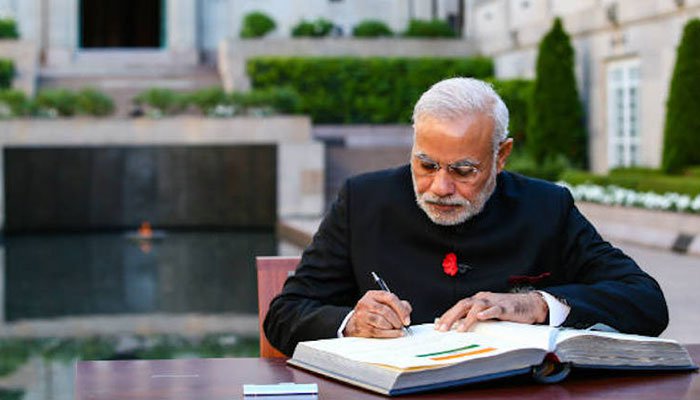Following the example of Prime Minister Imran Khan, Indian Prime Minister Narendra Modi on Wednesday penned an opinion piece for American news publication The New York Times.
Modi wrote the op-ed on the 150th birth anniversary of Indian independence leader Mahatma Gandhi, and discussed at length the principles of non-violence espoused by the revered Indian lawyer.
The decision to highlight the non-violent philosophy of Gandhi seemed like an effort to assuage western audiences after criticism over a draconian curfew imposed in occupied Kashmir by India since August 5.
PM Imran had lashed out Modi in his opinion piece for the NYT last month, comparing the measures in occupied Kashmir to Nazi Germany and Indian PM Modi to World War II villain Adolf Hitler.
The Indian premier, in his op-ed, wrote about Gandhi, Martin Luther King, Nelson Mandela, and the like, in an attempt to falsely relate himself with these global icons of peace.
It remains to be seen whether the homage paid to non-violent independence leaders from across the world would be enough to white-wash Indian crimes in occupied Kashmir.
On August 5, Indian PM Modi had revoked the constitutional autonomy of occupied Kashmir and imposed a military curfew in the area, imprisoning millions of innocent Kashmiris.
Thousands were arbitrarily detained as well, and fears of an impending genocide in the valley are being raised across the world. International media is also reporting torture of detainees by Indian forces.
Modi side-stepped discussing the Kashmir issue in his write-up, instead focusing on highlighting his sanitation programs, business acumen, and the non-violent philosophy of Gandhi.
“There have been many mass movements in the world, many strands of the freedom struggle even in India, but what sets apart the Gandhian struggle and those inspired by him is the wide-scale public participation,” Modi wrote.
“He never held administrative or elected office. He was never tempted by power. For him, independence was not absence of external rule. He saw a deep link between political independence and personal empowerment,” Modi added.
It is pertinent to mention that Indian PM Modi is a member of the right-wing Rashtriya Swayamsevak Sangh, an extremist right-wing group that assassinated Mahatma Gandhi for his soft stance on minorities back in 1948.
